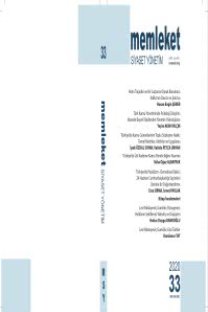Türkiye’de Çevre Politikaları: Değişen Söylemler, Değişmeyen Öncelikler
Kamu politikaları analizi görece genç bir disiplinler arası çalışma alanıdır. Ana akım politika analizi kamu politikalarının incelenmesi ve politika önerileri sunulması sürecinde önemli katkılar sağlamakla birlikte önerdiği çerçevenin sınırlı olduğu alanlar mevcuttur. Kamu politikalarının nesnel bir çerçevede ve ana akım politika analizinin önerdiği teknikler aracılığıyla belirlenmesi ve uygulanması varsayımlarına son dönemde yorumlamacı yaklaşımlar tarafından ciddi eleştiriler getirilmiştir. Yorumlamacı yaklaşımlar anlamın ilgili oyuncular tarafından nasıl ve hangi söylemler üzerinden kurulduğuna ve sonuçta bu anlam yapılarının kamu politikalarını ve nihayetinde kazanan ve kaybedenleri belirlediğini iddia eder. Özellikle çevre politikaları gibi bilim insanlarının bulgularının önem kazandığı, ancak bütün bu bulguların nasıl ve hangi söylemler üzerinden siyasal sürece eklemlendiğinin daha da önemli olduğu politika alanlarının çalışılması sürecinde önemli katkılar sağlamışlardır. Bu çalışma çevre politikalarını sadece teknik bazı çözümlerin belirlenip çözüm sürecine uygulanacağı bir süreç olarak gören yaklaşımlara eleştirel bir bakışla yaklaşarak yeni çevre politikası söylemlerinin var olan kurumsal bağlam ve bu bağlamda hâkim olan söylemlerle ilişkileri üzerinden anlama ve açıklama çabası içinde olan bir alternatif önerecektir.
Anahtar Kelimeler:
Çevre, Çevre Politikaları, Eleştirel Pespektif, Türkiye, Yorumlamacı Yaklaşımlar
Keywords:
Çevre, Çevre Politikaları, Yorumlamacı Yaklaşım- lar, Eleştirel Pespektif, Türkiye,
___
- Arts, B., M. Buizer, “Forests, discourses, institutions: A discursive-institutional analysis of global forest governance” Forest Policy and Economics, 11, 2009, s.340-347.
- Bäckstrand, K., A. Kronsell ve P. Söderholm, “Organisational Challenges to Susta- inable Development” Environmental Politics, 5:2, 1996, s.209-230.
- Baker, S., M. Kousis, D. Richardson ve S. Young, “Introduction”, S. Baker, M.
- Kousis, D. Richardson and S. Young (eds.) The Politics of Sustainable Deve- lopment: Theory, Policy and Practice within the European Union, Routledge, London and New York, 1997, s.1-42.
- Blyth, M., “Any More Bright Ideas?: The Ideational Turn of Comparative Political Economy” Comparative Politics 29:2, 1997, s.229-250.
- Crepaz, M.M.L., “Explaining National Variations of Air Pollution Levels: Political Institutions and Their Impact on Environmental Policy-Making” Environ- mental Politics, 4:3, 1995, s.391-414.
- Hajer, M.A., Politics of Environmental Discourse: Ecological Modernization and the Policy Process Clarendon Press, Oxford. 1995.
- Hajer, M., W. Versteeg , “A Decade of Discourse Analysis of Environmental Po- litics : Achievements, Challenges, Perspectives” Journal of Environmen- tal Policy and Planning, 7:3, 2005, s.175-184.
- Hall, P.A., “Conclusions: Politics of Keynesian Ideas” , P. Hall (ed.)., The Political Power of Economic Ideas: Keynesianism Across Nations, Princeton Univer- sity Press, Princeton, 1989, s.361-391.
- Hall, P.A., “Policy Paradigms, Social Learning and the State: The Case of Econo- mic Policy Making in Britain” Comparative Politics 25, 1993, s.275-296.
- Jahn, D., “Environmental Performance and Policy Regimes: Explaining Variations in Eigthteen OECD Countries” paper presented at XVIIth World Congress of IPSA in Seoul, S. Korea, 1997.
- Jänicke, M. ve H. Weidner, “Summary: Global Environmental Policy Learning” in M.Jänicke ve H. Weidner (der.) National Environmental Policies: A Compa- rative Study of Capacity Building Springer-Verlag, Berlin,1996, s.299-313.
- Jansen, Alf-Inge, O. Osland ve K. Hanf, “Environmental Challenges and Institutio- nal Changes: An Interpretation of the Development of Environmental Policy
- in Western Europe” içinde K. Hanf ve Alf-Inge Jansen (der.) Governance and Environment in Western Europe: Politics, Policy and Administration, Longman, Harlow, 1998, s.277-325.
- Lafferty, W.M. ve O. Langhelle, “Sustainable Development as Concept and Norm” in W.M. Lafferty ve O. Langhelle (der.) Towards Sustainable Development:
- On the Goals of Development-and the Conditions of Sustainability Macmil- lan Press, Londra, 1999.
- Lundqvist, L.J., “The International Spread of Ecological Modernisation Ideas” paper presented at International Workshop on Diffusion of Environmental Policy Innovations, Berlin, 8-9 December 2000.
- O’Riordan T. ve H. Voisey, “The Political Economy of the Sustainability Transi- tion” in T. O’Riordan and H. Voisey (eds.) The Transition to Sustainability:
- The Politics of Agenda 21 in Europe, Earthscan, Londra,1998, s.3-30.
- Orhan, Gökhan, “Lack of Evidence as Evidence: The Case of Air Pollution in Tur- key” 2012 Berlin Conference: Evidence for Sustainable Development, 5-6 October 2012, Freie Universitat Berlin.
- Orhan, Gökhan, “Institutions and Ideas in the Institutionalisation of Turkish Envi- ronmental Policy” Critical Policy Analysis, 1:1, 2007, s.42-61.
- Reitan, M., “Ecological Modernisation and ‘Realpolitik: Ideas, Interests and Insti- tutions” Environmental Politics, 7:2, 1998.
- Schmidt, Vivien A., “Taking ideas and discourse seriously:explaining change thro- ugh discursive institutionalisms: the fourth ‘new institutionalism’ European Political Science Review , 2:1, 2010, s.1-25.
- Scruggs, L., “Institutions and Environmental Performance in Seventeen Western Democracies” British Journal of Political Science, 29:1, 1999, s.1-31.
- Scruggs, L., “Is There Really a Link Between Neo-Corporatism and Environmen- tal Performance? Updated Evidence and New Data for the 1980s and 1990s” British Journal of Political Science, 31, 2001, s.686-692.
- Sikkink, K., Ideas and Institutions: Developmentalism in Argentina and Brazil, Cornell University Press, Ithaca, 1991.
- TÇSV, Türkiye’nin Çevre Politikası Nedir? Ne Olmalıdır?, Ankara, 1987.
- Weale, A., The New Politics of Pollution, Manchester University Press, Manches- ter, 1992.
- Yanow, D., Conducting Interpretive Policy Analysis, Thousand Oaks, Sage, 2000.
- Yanow, D., “Interpretation in Policy Analysis: On Methods and Practice” Critical Policy Analysis, 1:1, 2007, s.110-122.
- ISSN: 1306-8202
- Yayın Aralığı: 2
- Başlangıç: 2006
- Yayıncı: Yerel Yönetim Araştırma Yardım ve Eğitim Derneği (YAYED)
